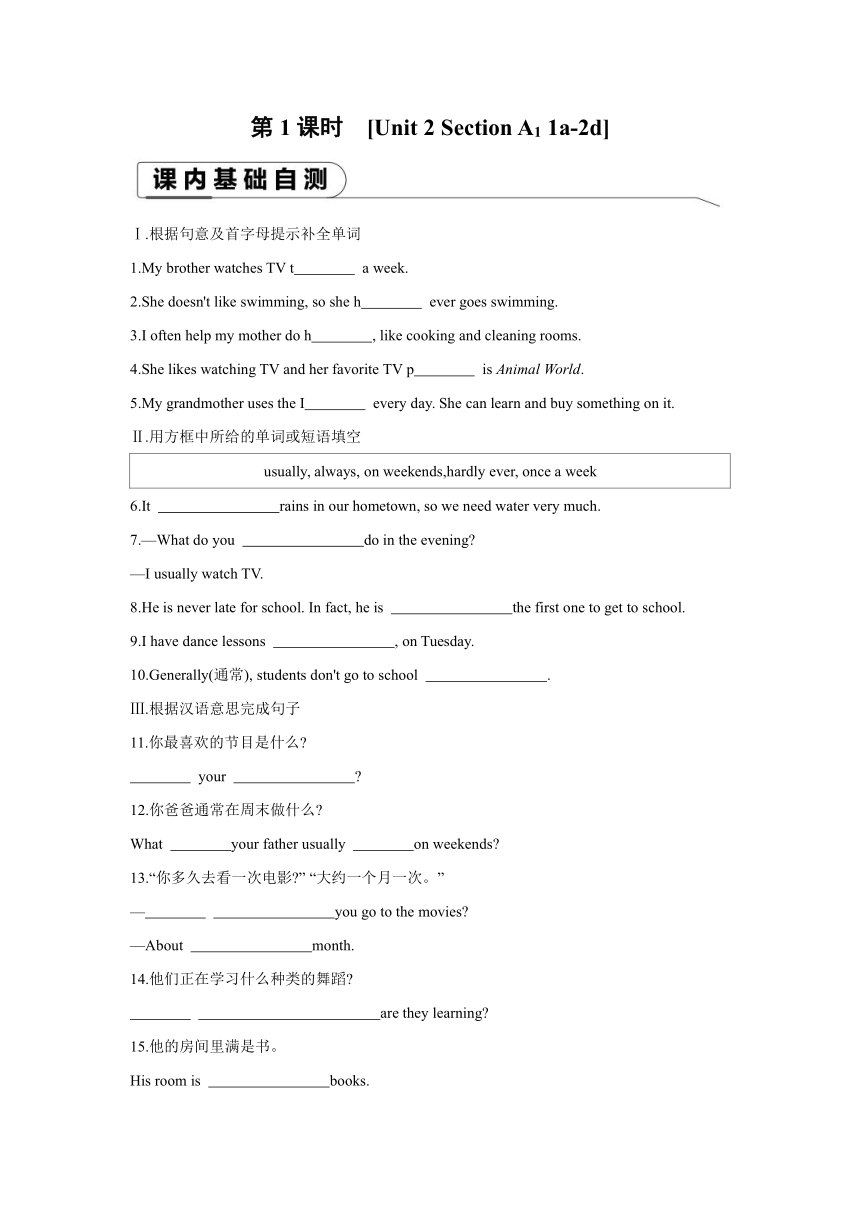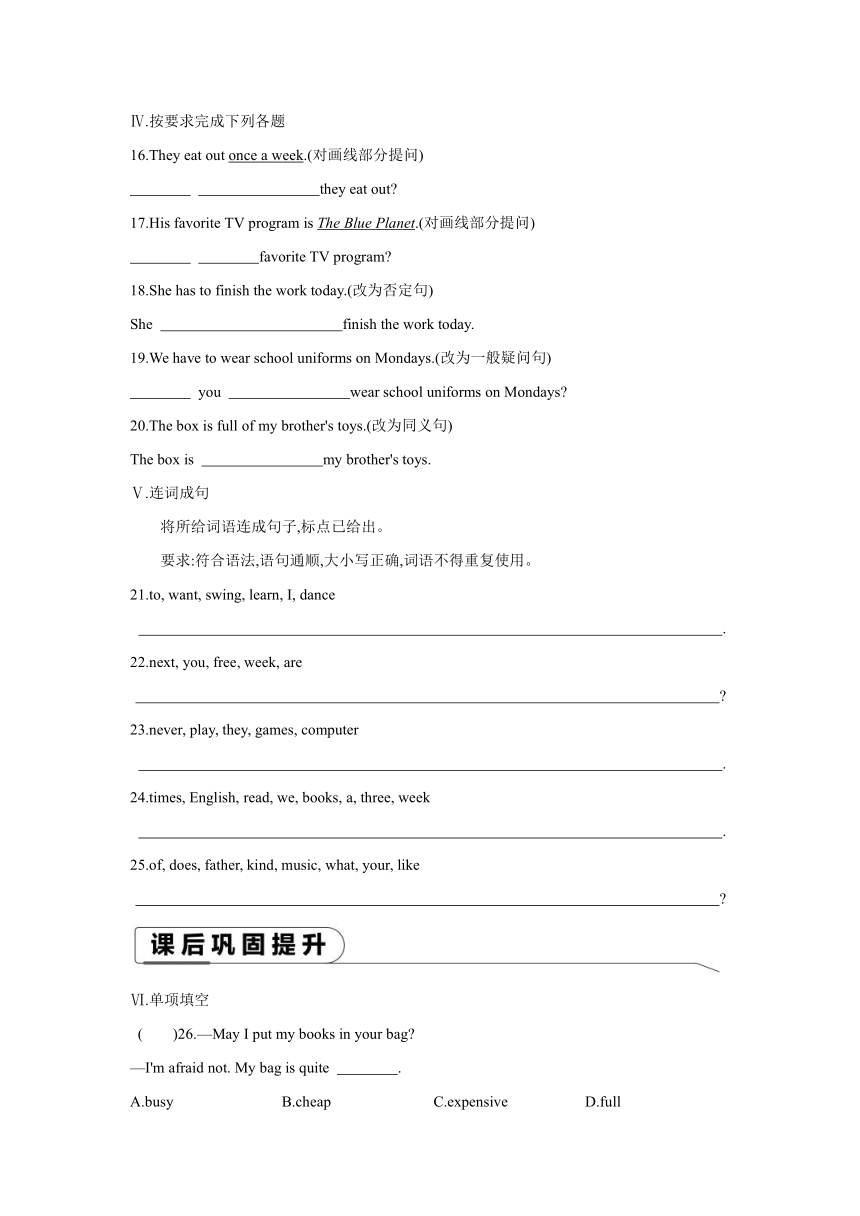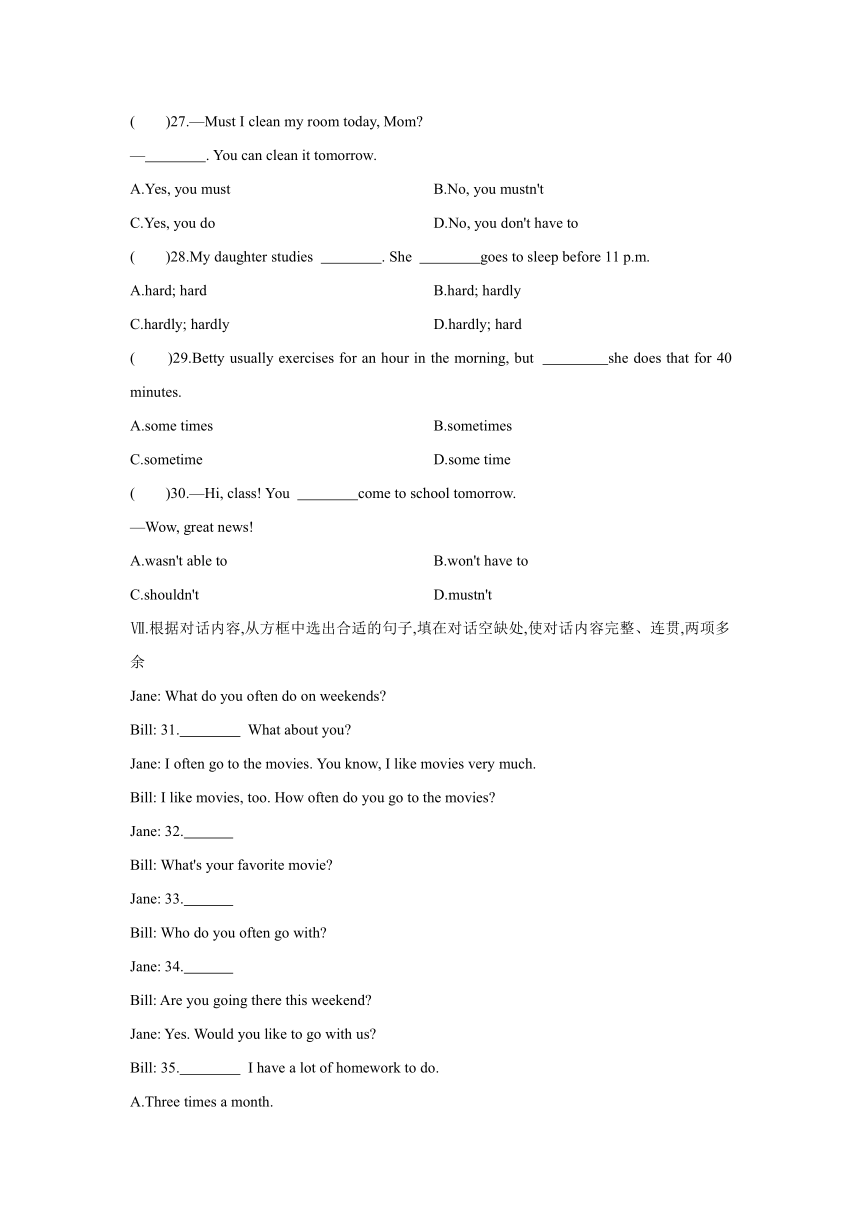Unit 2 How often do you exercise Section A1 1a-2d课时练(含答案)
文档属性
| 名称 | Unit 2 How often do you exercise Section A1 1a-2d课时练(含答案) |  | |
| 格式 | docx | ||
| 文件大小 | 80.7KB | ||
| 资源类型 | 教案 | ||
| 版本资源 | 人教新目标(Go for it)版 | ||
| 科目 | 英语 | ||
| 更新时间 | 2022-07-14 15:58:49 | ||
图片预览



文档简介
第1课时 [Unit 2 Section A1 1a-2d]
Ⅰ.根据句意及首字母提示补全单词
1.My brother watches TV t a week.
2.She doesn't like swimming, so she h ever goes swimming.
3.I often help my mother do h , like cooking and cleaning rooms.
4.She likes watching TV and her favorite TV p is Animal World.
5.My grandmother uses the I every day. She can learn and buy something on it.
Ⅱ.用方框中所给的单词或短语填空
usually, always, on weekends,hardly ever, once a week
6.It rains in our hometown, so we need water very much.
7.—What do you do in the evening
—I usually watch TV.
8.He is never late for school. In fact, he is the first one to get to school.
9.I have dance lessons , on Tuesday.
10.Generally(通常), students don't go to school .
Ⅲ.根据汉语意思完成句子
11.你最喜欢的节目是什么
your
12.你爸爸通常在周末做什么
What your father usually on weekends
13.“你多久去看一次电影 ” “大约一个月一次。”
— you go to the movies
—About month.
14.他们正在学习什么种类的舞蹈
are they learning
15.他的房间里满是书。
His room is books.
Ⅳ.按要求完成下列各题
16.They eat out once a week.(对画线部分提问)
they eat out
17.His favorite TV program is The Blue Planet.(对画线部分提问)
favorite TV program
18.She has to finish the work today.(改为否定句)
She finish the work today.
19.We have to wear school uniforms on Mondays.(改为一般疑问句)
you wear school uniforms on Mondays
20.The box is full of my brother's toys.(改为同义句)
The box is my brother's toys.
Ⅴ.连词成句
将所给词语连成句子,标点已给出。
要求:符合语法,语句通顺,大小写正确,词语不得重复使用。
21.to, want, swing, learn, I, dance
.
22.next, you, free, week, are
23.never, play, they, games, computer
.
24.times, English, read, we, books, a, three, week
.
25.of, does, father, kind, music, what, your, like
Ⅵ.单项填空
( )26.—May I put my books in your bag
—I'm afraid not. My bag is quite .
A.busy B.cheap C.expensive D.full
( )27.—Must I clean my room today, Mom
— . You can clean it tomorrow.
A.Yes, you must B.No, you mustn't
C.Yes, you do D.No, you don't have to
( )28.My daughter studies . She goes to sleep before 11 p.m.
A.hard; hard B.hard; hardly
C.hardly; hardly D.hardly; hard
( )29.Betty usually exercises for an hour in the morning, but she does that for 40 minutes.
A.some times B.sometimes
C.sometime D.some time
( )30.—Hi, class! You come to school tomorrow.
—Wow, great news!
A.wasn't able to B.won't have to
C.shouldn't D.mustn't
Ⅶ.根据对话内容,从方框中选出合适的句子,填在对话空缺处,使对话内容完整、连贯,两项多余
Jane: What do you often do on weekends
Bill: 31. What about you
Jane: I often go to the movies. You know, I like movies very much.
Bill: I like movies, too. How often do you go to the movies
Jane: 32.
Bill: What's your favorite movie
Jane: 33.
Bill: Who do you often go with
Jane: 34.
Bill: Are you going there this weekend
Jane: Yes. Would you like to go with us
Bill: 35. I have a lot of homework to do.
A.Three times a month.
B.Sorry, I can't.
C.I usually do my homework.
D.My good friend, Kate.
E.I don't like movies.
F.Kung Fu Panda.
G.Sure, I'd love to.
Ⅷ.阅读理解
Most people think martial arts(武术) are all about kicking, punching(用拳打) and fighting. But China's taijiquan, also known as tai chi, is the other way around. It is slow, calm, and peaceful.
UNESCO(联合国教科文组织) recently added tai chi to its Intangible Cultural Heritage List(非物质文化遗产名录). Although tai chi is an ancient martial art, it is still quite popular today. It has over 100 million fans in more than 150 countries.
People do tai chi as a way to stay fit. Unlike other exercise, it is “soft”—the muscles are relaxing, the joints(关节) are not fully bent(弯曲的), and you don't need to stretch(拉伸) too much. This means many can do it. You can practice it almost anytime and anywhere without anything. It is believed that practicing tai chi can help us have better control of our bodies so that we can stand, walk and run better.
But tai chi's benefits go beyond physical health. Marleni Calcina, a Peruvian woman who has practiced tai chi for more than 10 years, says it's not only a sport, but also a way of life. Tai chi has taught her the value of living more slowly.
Life and work used to stress her out. But she began to feel a change thanks to tai chi, which helped her get peace and inner harmony(内心的和谐). She told Xinhua, “For me now, practicing tai chi is like speaking with my soul(灵魂).”
( )36.The writer thinks tai chi is different from other exercise because .
A.it needs people to act quickly
B.it wants people to fight more
C.it can make people calm and peaceful
D.it can help people run faster
( )37.The underlined word “ancient” in the second paragraph means “ ” in Chinese.
A.古老的 B.现代的 C.陈旧的 D.固定的
( )38.From the third paragraph we can know that .
A.tai chi has a long history
B.tai chi is popular in the world
C.practicing tai chi needs much money
D.practicing tai chi is very useful
( )39.The writer mentions(提及) the Peruvian woman to tell us .
A.women can practice tai chi
B.people can get more from tai chi
C.only old people can practice tai chi
D.practicing tai chi needs a long time
( )40.What's the passage mainly about
A.The benefits of tai chi.
B.Who can play tai chi.
C.When to play tai chi.
D.How to play tai chi.
答案
Ⅰ.1.twice 2.hardly 3.housework
4.program 5.Internet
Ⅱ.6.hardly ever 7.usually 8.always
9.once a week 10.on weekends
Ⅲ.11.What’s; favorite program
12.does; do 13.How often do; once a
14.What kind of dance
15.full of/filled with
Ⅳ.16.How often do 17.What’s his
18.doesn’t have to 19.Do; have to
20.filled with
Ⅴ.21.I want to learn swing dance
22.Are you free next week
23.They never play computer games
24.We read English books three times a week
25.What kind of music does your father like
Ⅵ.26.D 考查形容词词义辨析。答语句意:恐怕不行,我的书包已经相当满了。故选D。
27.D 28.B
29.B 考查词义辨析。some times意为“几次”;sometimes意为“有时”;sometime意为“某个时候”;some time意为“一些时间”。由语境可知选B。
30.B 考查情态动词。句意:“嗨,同学们!你们明天不用来上学了。”“哇,很棒的消息!”由时间状语“tomorrow”可排除选项A。won’t have to意为“不必”;shouldn’t 意为“不应该”;mustn’t意为“禁止”。故选B。
Ⅶ.31—35 CAFDB
Ⅷ.【主旨大意】 本文讲述了一种很受欢迎的运动——太极拳。联合国教科文组织最近将太极拳列入非物质文化遗产名录。练习太极拳可以给人们带来很多益处,能修身养性。
36.C 推理判断题。由第一段中的“It is slow, calm, and peaceful.”可推断,练习太极拳可让人们平静和安宁。故选C。
37.A 词义猜测题。由短文第二段中的“it is still quite popular today”可知是古代与现在对比,由此推知,ancient意为“古老的”。
38.D 推理判断题。由第三段最后一句“It is believed that practicing tai chi can help us have better control of our bodies so that we can stand, walk and run better.”可推断,练习太极拳可以给人们带来很多好处。故选D。
39.B 推理判断题。由第四段中的“…it’s not only a sport, but also a way of life…”可知,Marleni Calcina认为太极拳不仅是一项运动,也是一种生活方式,太极拳让她懂得了慢生活的价值。由此可推断,人们从练习太极拳中可收获很多。
40.A 主旨大意题。通读全文内容可知,本文主要讲述了太极拳对人们的好处。故选A。
Ⅰ.根据句意及首字母提示补全单词
1.My brother watches TV t a week.
2.She doesn't like swimming, so she h ever goes swimming.
3.I often help my mother do h , like cooking and cleaning rooms.
4.She likes watching TV and her favorite TV p is Animal World.
5.My grandmother uses the I every day. She can learn and buy something on it.
Ⅱ.用方框中所给的单词或短语填空
usually, always, on weekends,hardly ever, once a week
6.It rains in our hometown, so we need water very much.
7.—What do you do in the evening
—I usually watch TV.
8.He is never late for school. In fact, he is the first one to get to school.
9.I have dance lessons , on Tuesday.
10.Generally(通常), students don't go to school .
Ⅲ.根据汉语意思完成句子
11.你最喜欢的节目是什么
your
12.你爸爸通常在周末做什么
What your father usually on weekends
13.“你多久去看一次电影 ” “大约一个月一次。”
— you go to the movies
—About month.
14.他们正在学习什么种类的舞蹈
are they learning
15.他的房间里满是书。
His room is books.
Ⅳ.按要求完成下列各题
16.They eat out once a week.(对画线部分提问)
they eat out
17.His favorite TV program is The Blue Planet.(对画线部分提问)
favorite TV program
18.She has to finish the work today.(改为否定句)
She finish the work today.
19.We have to wear school uniforms on Mondays.(改为一般疑问句)
you wear school uniforms on Mondays
20.The box is full of my brother's toys.(改为同义句)
The box is my brother's toys.
Ⅴ.连词成句
将所给词语连成句子,标点已给出。
要求:符合语法,语句通顺,大小写正确,词语不得重复使用。
21.to, want, swing, learn, I, dance
.
22.next, you, free, week, are
23.never, play, they, games, computer
.
24.times, English, read, we, books, a, three, week
.
25.of, does, father, kind, music, what, your, like
Ⅵ.单项填空
( )26.—May I put my books in your bag
—I'm afraid not. My bag is quite .
A.busy B.cheap C.expensive D.full
( )27.—Must I clean my room today, Mom
— . You can clean it tomorrow.
A.Yes, you must B.No, you mustn't
C.Yes, you do D.No, you don't have to
( )28.My daughter studies . She goes to sleep before 11 p.m.
A.hard; hard B.hard; hardly
C.hardly; hardly D.hardly; hard
( )29.Betty usually exercises for an hour in the morning, but she does that for 40 minutes.
A.some times B.sometimes
C.sometime D.some time
( )30.—Hi, class! You come to school tomorrow.
—Wow, great news!
A.wasn't able to B.won't have to
C.shouldn't D.mustn't
Ⅶ.根据对话内容,从方框中选出合适的句子,填在对话空缺处,使对话内容完整、连贯,两项多余
Jane: What do you often do on weekends
Bill: 31. What about you
Jane: I often go to the movies. You know, I like movies very much.
Bill: I like movies, too. How often do you go to the movies
Jane: 32.
Bill: What's your favorite movie
Jane: 33.
Bill: Who do you often go with
Jane: 34.
Bill: Are you going there this weekend
Jane: Yes. Would you like to go with us
Bill: 35. I have a lot of homework to do.
A.Three times a month.
B.Sorry, I can't.
C.I usually do my homework.
D.My good friend, Kate.
E.I don't like movies.
F.Kung Fu Panda.
G.Sure, I'd love to.
Ⅷ.阅读理解
Most people think martial arts(武术) are all about kicking, punching(用拳打) and fighting. But China's taijiquan, also known as tai chi, is the other way around. It is slow, calm, and peaceful.
UNESCO(联合国教科文组织) recently added tai chi to its Intangible Cultural Heritage List(非物质文化遗产名录). Although tai chi is an ancient martial art, it is still quite popular today. It has over 100 million fans in more than 150 countries.
People do tai chi as a way to stay fit. Unlike other exercise, it is “soft”—the muscles are relaxing, the joints(关节) are not fully bent(弯曲的), and you don't need to stretch(拉伸) too much. This means many can do it. You can practice it almost anytime and anywhere without anything. It is believed that practicing tai chi can help us have better control of our bodies so that we can stand, walk and run better.
But tai chi's benefits go beyond physical health. Marleni Calcina, a Peruvian woman who has practiced tai chi for more than 10 years, says it's not only a sport, but also a way of life. Tai chi has taught her the value of living more slowly.
Life and work used to stress her out. But she began to feel a change thanks to tai chi, which helped her get peace and inner harmony(内心的和谐). She told Xinhua, “For me now, practicing tai chi is like speaking with my soul(灵魂).”
( )36.The writer thinks tai chi is different from other exercise because .
A.it needs people to act quickly
B.it wants people to fight more
C.it can make people calm and peaceful
D.it can help people run faster
( )37.The underlined word “ancient” in the second paragraph means “ ” in Chinese.
A.古老的 B.现代的 C.陈旧的 D.固定的
( )38.From the third paragraph we can know that .
A.tai chi has a long history
B.tai chi is popular in the world
C.practicing tai chi needs much money
D.practicing tai chi is very useful
( )39.The writer mentions(提及) the Peruvian woman to tell us .
A.women can practice tai chi
B.people can get more from tai chi
C.only old people can practice tai chi
D.practicing tai chi needs a long time
( )40.What's the passage mainly about
A.The benefits of tai chi.
B.Who can play tai chi.
C.When to play tai chi.
D.How to play tai chi.
答案
Ⅰ.1.twice 2.hardly 3.housework
4.program 5.Internet
Ⅱ.6.hardly ever 7.usually 8.always
9.once a week 10.on weekends
Ⅲ.11.What’s; favorite program
12.does; do 13.How often do; once a
14.What kind of dance
15.full of/filled with
Ⅳ.16.How often do 17.What’s his
18.doesn’t have to 19.Do; have to
20.filled with
Ⅴ.21.I want to learn swing dance
22.Are you free next week
23.They never play computer games
24.We read English books three times a week
25.What kind of music does your father like
Ⅵ.26.D 考查形容词词义辨析。答语句意:恐怕不行,我的书包已经相当满了。故选D。
27.D 28.B
29.B 考查词义辨析。some times意为“几次”;sometimes意为“有时”;sometime意为“某个时候”;some time意为“一些时间”。由语境可知选B。
30.B 考查情态动词。句意:“嗨,同学们!你们明天不用来上学了。”“哇,很棒的消息!”由时间状语“tomorrow”可排除选项A。won’t have to意为“不必”;shouldn’t 意为“不应该”;mustn’t意为“禁止”。故选B。
Ⅶ.31—35 CAFDB
Ⅷ.【主旨大意】 本文讲述了一种很受欢迎的运动——太极拳。联合国教科文组织最近将太极拳列入非物质文化遗产名录。练习太极拳可以给人们带来很多益处,能修身养性。
36.C 推理判断题。由第一段中的“It is slow, calm, and peaceful.”可推断,练习太极拳可让人们平静和安宁。故选C。
37.A 词义猜测题。由短文第二段中的“it is still quite popular today”可知是古代与现在对比,由此推知,ancient意为“古老的”。
38.D 推理判断题。由第三段最后一句“It is believed that practicing tai chi can help us have better control of our bodies so that we can stand, walk and run better.”可推断,练习太极拳可以给人们带来很多好处。故选D。
39.B 推理判断题。由第四段中的“…it’s not only a sport, but also a way of life…”可知,Marleni Calcina认为太极拳不仅是一项运动,也是一种生活方式,太极拳让她懂得了慢生活的价值。由此可推断,人们从练习太极拳中可收获很多。
40.A 主旨大意题。通读全文内容可知,本文主要讲述了太极拳对人们的好处。故选A。
同课章节目录
- Unit 1 Where did you go on vacation?
- Section A
- Section B
- Unit 2 How often do you exercise?
- Section A
- Section B
- Unit 3 I'm more outgoing than my sister.
- Section A
- Section B
- Unit 4 What's the best movie theater?
- Section A
- Section B
- Unit 5 Do you want to watch a game show?
- Section A
- Section B
- Unit 6 I'm going to study computer science.
- Section A
- Section B
- Unit 7 Will people have robots?
- Section A
- Section B
- Unit 8 How do you make a banana milk shake?
- Section A
- Section B
- Unit 9 Can you come to my party?
- Section A
- Section B
- Unit 10 If you go to the party, you'll have a grea
- Section A
- Section B
